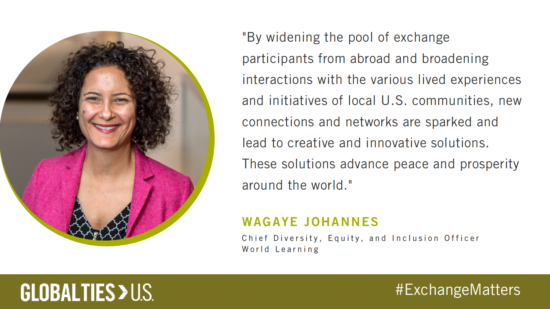By Wagaye Johannes, Chief Diversity, Equity, and Inclusion Officer, World Learning

Why is it important to World Learning to have a dedicated DEIA+ officer?
Our core values – community, social inclusion & justice, intercultural understanding, and sustainability – are a window into our culture and organizational behavior. They are deeply ingrained principles that drive decision-making and are reflected in how we do our work and fulfill our mission.
A few years ago, World Learning and our partner organization School for International Training (SIT) partnered with Diversity Abroad to conduct an organizational assessment to examine where it has made progress as a global organization and higher education institution and where it might have fallen short in order to create positive systemic change. The assessment showed that we had fragmented efforts around diversity, equity, and inclusion and needed a more comprehensive approach to truly live up to our core values and mission of creating a more sustainable, peaceful, and just world. Prioritizing and investing in diversity and inclusion made sense as the organization reached a milestone in its history – celebrating 90 years in 2022 – and to move closer toward its mission to empower people and strengthen institutions through education, sustainable development, and exchange for the next 90 years.
A committee of employees representing a cross-section of the organization came together to discuss how we should talk about our work in diversity, equity, and inclusion both internally and externally and settled on “Diversity, Equity, Inclusion, and Access (DEIA+).” The addition of the “+” in the acronym represents an important acknowledgment that there are other equally important principles, such as justice or belonging – that also guide our action around this work.
What is your role in the organization?
As a member of the senior team, my role as the Chief Diversity, Equity, and Inclusion Officer is to advance strategic DEIA+ efforts across the global community of staff, students, and faculty that makes up World Learning. In practice, that means ensuring diversity, equity, and inclusion are woven into our culture, policies, processes, and programs.
We recently created a framework that will further align our operational and programmatic efforts around DEIA+. For the work of DEIA+ to have a lasting impact, how we operate as an organization is related to how we design and implement our programs. One cannot be done without the other. How we support our staff and create a sense of belonging in the workplace goes hand-in-hand with how we support our exchange participants. Not only should our people be reflective of the communities in which we live and work, but we must also make sure our people, who are the practitioners, have the competencies and skills to design and implement inclusive programming.
How does your role tie into World Learning’s exchange program design/implementation?
Inclusive and equitable policies are at the heart of what World Learning does, and the organization has the privilege to administer some of the U.S. Department of State’s programs including the International Visitor Leadership Program (IVLP), Youth Ambassadors, and the Professional Fellows Program. In my role, I partner closely with our Global Programs Community of Practice to share knowledge and best practices and ensure that DEIA+ principles are incorporated into our programs. That could mean designing materials and training sessions that are accessible to the widest range of participants or partnering with organizations to reach populations that historically have not been included in exchange programs.
What should international exchange professionals keep in mind as they apply a DEIA+ lens to programming?
The United States is one of the most diverse countries in the world, and our exchange practitioners must reflect the diversity of lived experiences that embodies it. When it comes to designing inclusive programming, we need to ask: Who is not participating in our programs and why? What does it mean to be inclusive and equitable when we engage with local organizations, communities, or host families? Despite the intense hardships of the pandemic, it highlighted that we have the power to innovate and to explore how we design our programs in a more inclusive way. World Learning and many others adapted and used online technology to conduct orientations, connect and support grantees, and deliver learning opportunities. What other new and innovative approaches are out there? As an organization steeped in experiential learning, I am excited about the opportunities that World Learning has to share and develop tools for more inclusive programming in international exchange.
Can you speak to the importance of diversifying the pool of exchange participants from abroad, as well as their interactions with U.S. citizens in host communities?
When people have the chance to truly engage with one another, to actively listen to another perspective – whether it is over a meal, during a classroom or site visit, or in a virtual setting – that experience stays with a person in a profound way. Exchanges change lives. Lifelong professional, academic, and personal networks are created. By widening the pool of exchange participants from abroad and broadening interactions with the various lived experiences and initiatives of local U.S. communities, new connections and networks are sparked and lead to creative and innovative solutions. These solutions advance peace and prosperity around the world.
